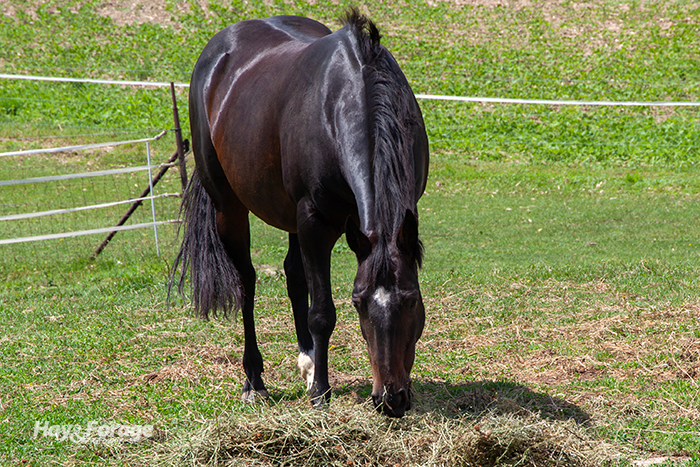
There are still those horse owners who think that hay treated with an organic acid preservative could have deleterious health or performance effects on their animals.
Products such as buffered propionic acid are sometimes used to prevent heating and molding in hay after it is harvested or stored. Typically, this is only done when the hay’s harvest moisture is marginally above the optimum level for safe storage and helps limit the risk for mold growth. For hay that is excessively above a safe baling moisture, not even preservatives can save the crop.
“Generally, hay baled at 15% moisture or below is unlikely to mold,” writes Krishona Martinson in a recent Horse Newsletter from the University of Minnesota. “Ideal moisture varies by bale type and mass. Preservatives are the most economical and effective at preventing mold growth when applied to hay baled between 17% and 22% moisture.”
Research has shown that organic acids are effective for preserving hay when applied at recommended rates, and feeding treated hay to ruminant animals has never been an issue or raised any concerns. That isn’t always the case for horses, but fortunately, research also exists to help debunk or confirm the notion that feeding treated hay to horses is detrimental.
An untreated preference
Martinson, an extension equine specialist, cites separate studies from Cornell University and the University of Illinois that showed horses preferred untreated hay over hay treated with an organic acid preservative when given a choice; however, horses readily consumed the treated hay when a choice was not given. She points out that a horse’s hindgut bacteria actually produce propionic acid as a result of microbial fermentation.
From a performance standpoint, horse yearlings fed the preservative-treated hay had similar intakes and weight gains during the research trial period compared to yearlings that ate untreated hay. “Treated hay did not affect clinical measures of the yearlings' well-being, which indicates the preservative did not negatively affect the horses,” Martinson states.
Although preservative-treated hay may not be a horse’s first meal choice, owners can be assured that feeding their equine animals treated hay is a safe and common practice. Most haymakers would prefer not to use a preservative because it adds expense; however, these products are sometimes needed when weather conditions are less than optimum to ensure safe storage and mold-free hay.

